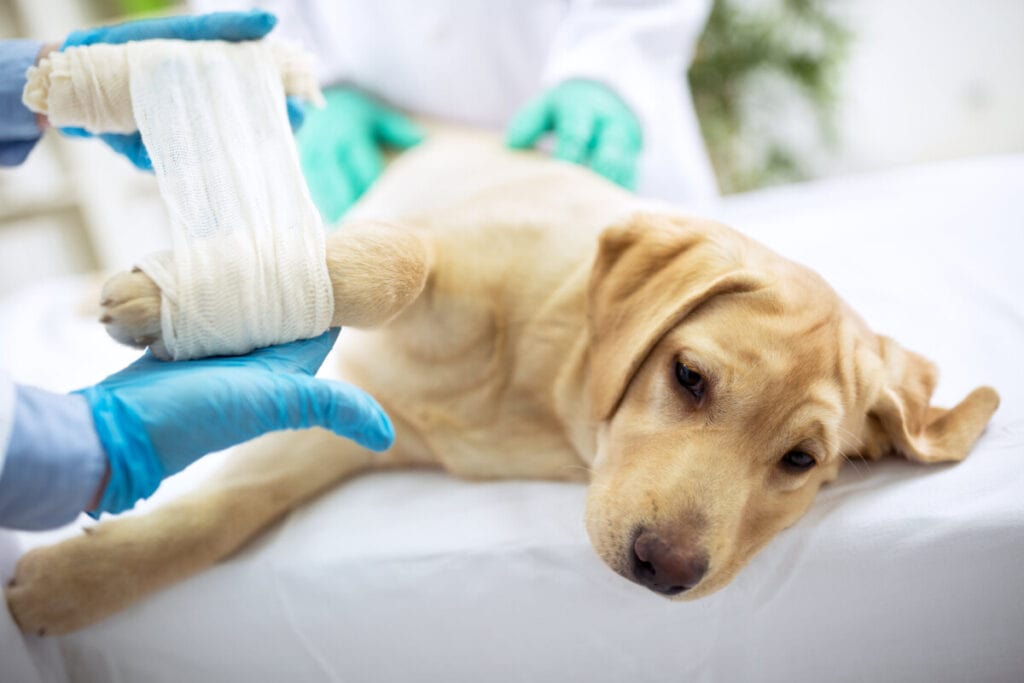Are Labs Prone to Health Problems?
It’s important to know that every single dog breed has its set of health issues, including Labrador Retrievers. What are some of the health problems that labs are more prone to?
Labrador Retrievers are more prone to health concerns such as arthritis, canine hip dysplasia, seizures, cancer, and patellar luxation just to name a few. It’s very important to adopt a Labrador from a reputable breeder to ensure that these health issues are not as prevalent.
Let’s dive a little deeper into each health concern and what you can do to treat and prevent each of these issues.
Canine Hip, Elbow, and Shoulder Dysplasia
Since labs are an extremely active breed, they are often running and exercising, which is why they are a candidate for hip problems, which is known as Canine Hip Dysplasia or CHD.
Labs are also prone to other joint problems in the shoulder and elbow, which is called osteochondritis dissecans or OCD. Let’s go into details about each of these health issues so that you will know the signs and treatments for each.
Canine Hip Dysplasia (CHD)
CHD is when the hip joint loosely fits within the socket, which can cause pain, limb dysfunction, and a host of other problems. If the hip does not form correctly, the bones will grind on one another, which can make the bones deteriorate over time.
This health concern derives mostly from genetics but it can also occur from rapid weight gain or growth depending on the lab’s diet. If you are worried that your lab might have CHD, there are a few signs and symptoms that you should look out for, including:
- Limping and lameness in hind legs
- Loss of muscle mass on rear limbs
- Putting weight on front legs which cause muscle enlargement on front shoulders
- Hip Pain
- Loss of range of motion
If your lab is experiencing or showing any of the following symptoms, it is best to take them to the veterinarian to be diagnosed with CHD. Luckily, there are a few things that you can do to try to avoid CHD in the first place. If you adopt a Labrador Retriever as a puppy, ensure that you get them from a reputable breeder.
The AKC says that large breed puppies, such as labs, can eat formula-enriched foods that help the skeleton to not grow too quickly. Make sure that your lab gets enough exercise because obesity is often seen in a dog with CHD.

Osteochondritis Dysplasia (OCD)
OCD is very similar to CHD, except it is focused on the shoulder and elbow joints rather than the hips. According to the VCA, OCD occurs when the cartilage on the end of the bone does not form properly.
Since the cartilage is not attached to the bone as it should be, lesions, flaps, and complete detachments of the cartilage can occur. Since labs grow so much between 6 and 9 months, they are more likely to experience OCD.
The signs for OCD are similar to CHD and include:
- Limping or lameness
- Pain in affected area
- Joint is swollen and can be warm to the touch
- Avoids putting weight on affected leg
Depending on the severity of your lab’s OCD, they might need to take a break from activities and long exercise routines. If the cartilage is broken off or folded into the joint, your lab might need to go through surgery to have the cartilage inspected. Of course, take your lab to the vet if you suspect that they are suffering from OCD.
Patellar Luxation
Patellar luxation means that the kneecap is out of place because the patella is known as the kneecap and luxation just means “out of place.” This can occur if the point of attachment is not on the center of the shin. (Source)
Patellar luxation can come and go if the muscle goes back into its proper place, but it is important to observe your lab if they are showing these signs:
- Limp
- Bowlegged hind legs
- When knee is bent, there are cracking or popping noises
Some dogs can live with patellar luxation their whole lives depending on the severity. If their patella is always out of place, your lab could benefit from surgery. Correcting the patella can be a costly procedure, which ranges from $1500 to $3000.
Arthritis

Large dogs such as labs are predisposed to arthritis. Many factors can cause arthritis, including obesity, age, injuries, infections in joints, and improper nutrition just to name a few. If your dog has arthritis, they might be showing the following signs:
- Lack of Energy
- Pain when touched
- Weight Gain
- Loss of muscle mass
Over time, the cartilage in labs’ bones will deteriorate. It is a progressive disease and the cure is unknown. If your lab is suffering from arthritis, the best thing to do is to go to your veterinarian often and use joint supplements as prescribed.
Seizures
Dogs of any breed can suffer from seizures, but Labrador Retrievers are more likely to have epilepsy in comparison to other dog breeds. Of course, there are other reasons why labs might suffer from seizures including brain cancer, strokes, liver disease, etc. (Source)
If your dog is having a seizure, remember to stay calm and to make sure that your lab is in a safe place. Do not touch their head or mouth since they can bite you even while seizing. If your lab is experiencing a seizure that is taking longer than a few minutes, try to keep them cool since seizures can cause overheating. Call your veterinarian once the seizure ends.
Finding a Reputable Breeder
Many of the problems mentioned above can occur from genetic health issues. This is why you want to do thorough research before you adopt a Labrador Retriever. It would be best to purchase a lab from a breeder listed on The Labrador Retriever Club website.
If you live near one of the listed breeders, you can get in contact with them and see if you can visit a litter of puppies before adopting one. If there is not a reputable lab breeder in your area, be sure to stay away from pet scams that breed dogs with prevalent genetic disorders.






